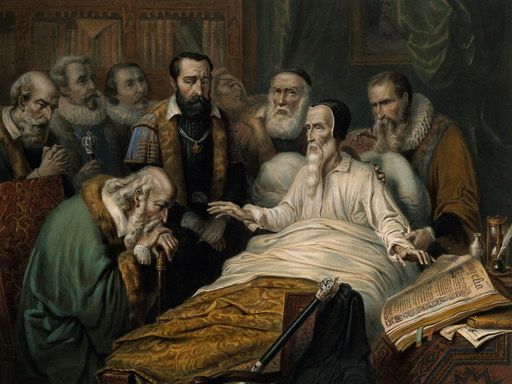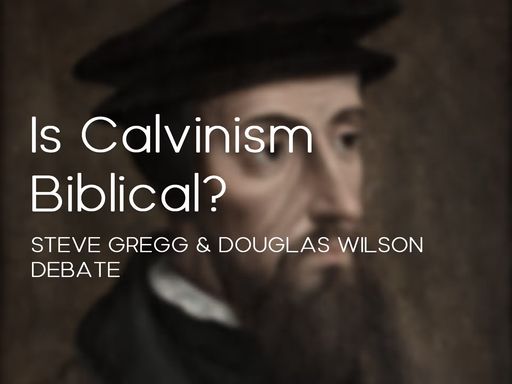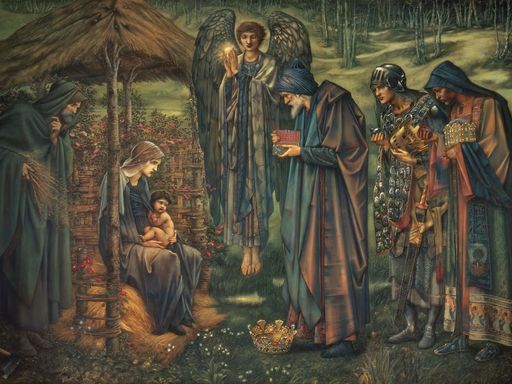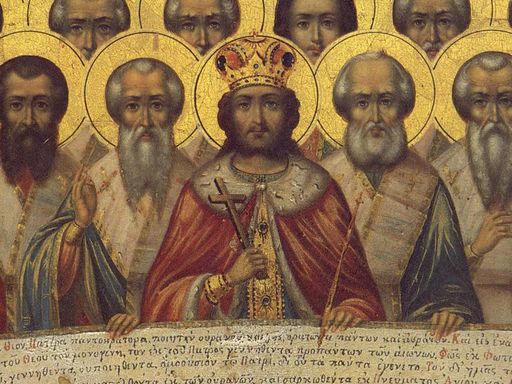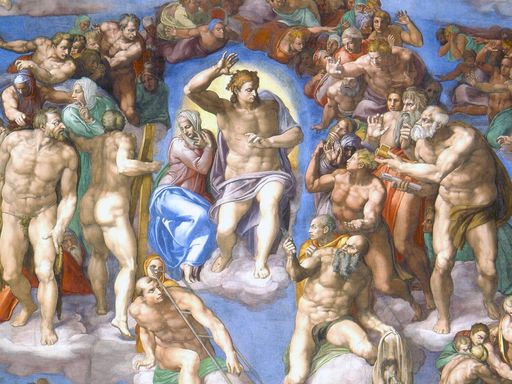
Individual Topics
Steve Gregg
This is a series of over 100 lectures by Steve Gregg on various topics, including idolatry, friendships, truth, persecution, astrology, Bible study, and the importance of loving one's spouse. Gregg emphasizes the importance of aligning oneself with God's values and teachings for spiritual growth and fulfillment.

A Chosen People
Steve Gregg discusses the concept of a "chosen people" in the Bible, starting with the children of Israel in the Exodus era who were chosen by God with conditions of obedience. He explains that God deals with human beings collectively, often dealing with entire nations. The author then connects the

A Christian Coping with Grief
In his discussion of coping with grief, Steve Gregg, a Christian author and speaker, emphasizes that grieving is a natural and legitimate response to the loss of a loved one. He draws examples from the Biblical stories of Lazarus, Abraham, and Job to illustrate that even people of faith can struggle

A Teachable Spirit
In "A Teachable Spirit," Steve Gregg emphasizes the importance of being open to correction and instruction in order to achieve Christian growth and maturity. Drawing near to God requires continual change and transition towards God-likeness, and a teachable spirit is essential in this process. A pers

A Teachable Spirit (2019)
In "A Teachable Spirit", Steve Gregg stresses the importance of having a humble and receptive attitude to growth as a Christian. He emphasizes that character, love, holiness, and an increasing understanding of God are all indicators of Christian growth, and that a willingness to receive instruction

A Vision for Children
Steve Gregg argues that society lacks a vision for children, including among Christians. He suggests that children are a gift from God and should be valued as such. Gregg believes investing in and raising children to be followers of Christ is crucial for creating a better future and a more godly wor

Abiding in Christ
In "Abiding in Christ," Steve Gregg explores the concept of remaining connected to Jesus Christ as one's Lord and abiding in Him as a dynamic relationship that requires continual effort and interaction. Gregg emphasizes the importance of abiding in Christ for salvation and remaining faithful and fru

Astrology
Steve Gregg concisely discusses the history of astrology, its pagan roots, and its conflict with Christian beliefs. He touches on the Bible's mentioning of stars as signs and God's divine appointment of constellations, which tell the story of redemption through Jesus Christ. He concludes by emphasiz

Atheism
Steve Gregg challenges the idea that atheism can answer all fundamental questions and argues that it is not a rational position because it is often driven by emotional reactions to the concept of God. He asserts that atheists have faith in unproven beliefs similar to religious people. Gregg believes

Authority of Scripture: A Survey
In "Authority of Scripture: A Survey" by Steve Gregg, the author argues that the Bible is the final authority for Christians, containing the revealed mind of God. While younger generations may reject the Bible due to a lack of understanding and cultural indoctrination, the authors of the Bible were

Backsliding
In "Backsliding," Steve Gregg delves into the topic of turning away from God and slipping backward in one's spiritual journey. He identifies two types of backsliders: those who lose ground but remain Christians, and those who defect and apostatize from the faith. Through examples from the Bible, Gre

Battle for the Truth (Part 1)
In his discussion, Steve Gregg speaks about the decline of truth in society, attributing it to Satan's deception of Eve. He notes that society is becoming more irrational and unable to distinguish between truth and lies, with attacks on fundamental truths such as marriage and gender being a satanic

Battle for the Truth (Part 2)
Steve Gregg discusses the battle for truth in society and the spiritual warfare against lies and falsehoods. He argues that reality is objective and truth conforms to it, contending that standing up for truth is important in courts, Congress, universities, and even churches. The absence of the Word

Becoming a Disciple of Christ
In his discourse, Steve Gregg explores the conditions of discipleship as outlined by Jesus in Luke chapter 14. He emphasizes that becoming a true disciple of Christ entails total devotion and sacrifice, prioritizing the love for Jesus above all else. Gregg draws parallels between Christian disciples

Being a Disciple in the Kingdom of God
In "Being a Disciple in the Kingdom of God," Steve Gregg emphasizes the importance of following Jesus as the appointed and anointed King. He describes being a disciple as a commitment that demands full loyalty and submission to Christ. This involves a transfer of ownership and stewardship of one's l

Being the Church
In "Being the Church," Steve Gregg discusses the modern definition of "church" and how it differs from the biblical definition. He emphasizes that the church is not merely an organization or building, but a community of genuine followers of Christ who care for and serve one another. Gregg argues tha

Blessed are the Peacemakers
In his discussion of the Beatitudes, Steve Gregg highlights the importance of being a peacemaker. According to Gregg, peacemaking is a God-like trait that involves promoting peace even with our enemies. This approach requires reconciling broken relationships due to sin, forgiving others, and seeking

Blessed are the Persecuted
In his talk, Steve Gregg discusses the final Beatitude - "blessed are the persecuted for righteousness sake, for theirs is the kingdom of heaven". He explains that being blessed does not necessarily equate to feeling happy, but rather being enviable, fortunate, and happy for a good reason. Persecuti

Bottom Line Interview (2017)
Steve Gregg, host of the religious radio program "Narrow Path," shares his views on spirituality and faith in a recent interview. Gregg emphasizes the importance of responding to God's call and using one's talents and opportunities to serve Him. He discusses his experiences as a Bible teacher and th

Bottom Line Interview (2021)
Steve Gregg, a seasoned veteran of faith and a Bible teacher, was recently interviewed on the Bottom Line Show. In the interview, Gregg mentioned his background in physical health, his passion for transparent dialogue about controversial topics, and his newly published books. He also discussed his w

Cain and Abel
Steve Gregg delves into the story of Cain and Abel from a biblical perspective. He notes that while there is a heretical interpretation that suggests Cain was Satan's offspring, there is no merit to this belief. Cain's offering was not accepted by God, possibly because his heart wasn't in the right

Christian Response to Gay Marriage
In "Christian Response to Gay Marriage," Steve Gregg argues for the biblical definition of marriage as a divine institution between one man and one woman, grounded in the relationship between Christ and the church. He believes that Christians must resist the cultural shift towards acceptance of same

Communion (Part 1)
In "Communion (Part 1)" by Steve Gregg, different views on the practice of Communion, also known as the Eucharist, among various Christian denominations are discussed. While the Catholic view involves the transformation of the bread and wine into the literal body and blood of Jesus Christ, Protestan

Communion (Part 2)
In "Communion (Part 2)", Steve Gregg explores the Catholic doctrine of transubstantiation, which claims that the bread and wine consumed during communion become the actual body and blood of Christ. Gregg argues that this idea is not supported by scripture and can restrict one's relationship with God

Cults (Part 1)
In "Cults (Part 1)," Steve Gregg distinguishes cults from mainstream Christianity by significant theological differences, including beliefs about the Trinity, divinity of Jesus, and salvation through works. He also notes the sociological characteristics of some cults, including absolute authority of

Cults (Part 2) - Mormonism
In this discussion, Steve Gregg presents a case for why Mormonism should be considered a cult. He argues that Mormonism deviates significantly from Christian doctrine while claiming to be Christian, and relies on an authority above scripture for spiritual guidance. The history and authoritative sour

Demon Possession
Steve Gregg provides an in-depth analysis of the topic of demon possession. He notes that the term "demon possession" is not found in the Bible and discusses the distinction between being "demon possessed" and "demon oppressed." Gregg argues that while some cases of apparent demon possession might h

Demons (Part 1)
In this presentation, Steve Gregg discusses the topic of demons, including their existence, influence, and how they can affect people. He covers major points such as the recognition of demon possession by Jesus and his apostles, the different terms used to refer to demons in the Bible, and the impac

Demons (Part 2)
Steve Gregg discusses the phenomenon of demon possession in the Bible and its continued occurrence today. He notes that the term "demon-possessed" is not an entirely accurate translation of the Greek word "daimonidzimai". Different cases of possession are described in the Bible, and Jesus cast out d

Disappointment with God
In his address on "Disappointment with God," Steve Gregg emphasizes the importance of love and commitment in seeking and knowing God. He notes that unrealistic expectations, a self-centered approach to the gospel, and a lack of understanding of God's ways can lead to disappointment. However, he offe

Discipleship
In this talk, Steve Gregg explores the meaning of being a disciple of Jesus. He emphasizes the importance of putting God's will above personal desires and the need for repentance and a change in mindset. Gregg also discusses the concept of lordship and the total surrender that discipleship requires.

Faithfulness
Steve Gregg discusses the importance of faithfulness as a characteristic that leads to personal transformation and a deeper relationship with God. He emphasizes the need for Christians to seek an understanding of God's character through studying Scripture and integrating those values into their own

False Prophets
In his talk, "False Prophets," Steve Gregg discusses the significance of false prophets in both the New and Old Testament. He notes how false prophets may lead individuals away from God by claiming to speak for Him while not speaking rightly. Gregg emphasizes the importance of examining the fruits o

Forgiveness
Steve Gregg discusses forgiveness as a Christian duty, emphasizing the importance of letting go of anger and wrath and leaving it to God. Forgiveness does not necessarily mean letting the offender off the hook or withholding legal actions to ensure justice. Christians who refuse to forgive others wi

Friendship
Steve Gregg emphasizes the importance of friendships and their role in shaping personality and moral values. He distinguishes between worldly and Christian friendships and emphasizes the significance of biblical principles and sacrificial love in friendships among believers. Gregg stresses the need

Gifts of the Holy Spirit (Part 1)
In this talk, Steve Gregg discusses the concept of the Gifts of the Holy Spirit in the context of the Body of Christ. He explains that these gifts are given by the Holy Spirit for the benefit of the entire body and emphasizes the importance of understanding the concept of the body of Christ to fully

Gifts of the Holy Spirit (Part 2)
Steve Gregg explains that the Gifts of the Holy Spirit can be divided into five categories: gifts of revelation, power, utterance, corporate ministry, and individual ministry. He emphasizes that these gifts are not meant to divide but rather to serve in different ways. Using one's gifts for the bene

Gifts of the Holy Spirit (Part 3)
In this talk, Steve Gregg discussed the various gifts of the Holy Spirit as listed by Paul in 1 Corinthians 12 and Romans 12. He emphasized the importance of using spiritual gifts to serve the body of Christ and cautioned that miracles and prophecies must be tested to ensure they are from God. Gregg

Gospel in the Stars
Steve Gregg presents the theory of the "Gospel in the Stars", which proposes that the zodiac signs were designed by God to proclaim the Gospel in a certain manner. The theory suggests that the twelve zodiac constellations were passed down through generations, containing a connection to the gospel me

Hell: Three Christian Views
In "Hell: Three Christian Views," Steve Gregg presents three different interpretations of the concept of Hell in Christianity. While the traditional view is based on divine retribution, there are alternative views that include the destruction of the wicked and the belief that everyone will eventuall

How To Love Your Wife
In this insightful talk, Steve Gregg delves into the importance of loving one's wife as Christ loves the church, acknowledging that the subject matter can be sensitive but emphasizing the duty that husbands have to love their respective partners in such a way. The speaker notes that a husband's role

How to Study the Bible (Part 1)
Steve Gregg provides insights on how to study the Bible effectively by discussing the importance of understanding the Bible correctly, attaching faith, familiarity with the Bible, choosing the right version, and considering translation philosophy and manuscript choice. He also highlights various res

How to Study the Bible (Part 2)
In this discourse, Steve Gregg outlines important steps to studying the Bible. He emphasizes the significance of becoming familiar with the text and understanding it in its unique human language, which involves careful observation and questioning. He also highlights the importance of studying unfami

How to Walk in the Spirit
In this piece, Steve Gregg explores the concept of "walking in the spirit," which refers to living a life according to spiritual principles. He highlights the importance of the Holy Spirit in guiding and empowering believers to live a holy life, and emphasizes the need to combine the insights of the

Humility (Part 1)
In his teachings, Steve Gregg emphasizes the importance of humility as a character trait for walking with God acceptably. Pride is considered a heinous sin that goes against the reality of who we truly are before God. True humility involves self-forgetfulness and serving others, while false humility

Humility (Part 2)
Steve Gregg discusses the concept of humility and pride in a religious context. He explains that people often give value to things that are not of importance to God, such as physical strength or riches, and that pride is a delusion of superiority that affixes artificial value. Gregg suggests that on

Idolatry
In this discussion, Steve Gregg examines the concept of idolatry beyond the worship of physical statues or images. He emphasizes that idolatry could manifest in various forms, including love of possessions, pleasure, and self-worship. The effects of idolatry can hinder God's intervention and are off

Improving Our Praying
Steve Gregg discusses ways to improve one's prayer life by drawing on passages from the New Testament, specifically Luke 18.1 and James chapter 4. He emphasizes the importance of not losing heart and surrendering to God's will while focusing on the model prayer taught by Jesus. The key takeaway is t

Introduction to the Book of Revelation
In his exploration of the book of Revelation, Bible scholar Steve Gregg notes that the text comprises three genres: prophecy, epistle, and apocalypse. The book uses symbolic language to convey messages, and biblical numbers are often used symbolically to convey completeness or minority status. Inter

Is The Bible True? (Part 1)
In this talk, Steve Gregg discusses the question of whether the Bible is true. Greg explains that the Bible is a collection of 66 separate documents written by approximately 40 authors over a period of 1,400 years, and its claim for truth remains despite being academically attacked in various ways e

Is The Bible True? (Part 2)
In part two of his discussion on the reliability of the Bible, Steve Gregg argues that the Bible should be assessed primarily based on its testimony of Jesus Christ as the central figure of Christianity. He points to the detailed and credible accounts of the Gospels, as well as secular sources such

James: The Man And His Book
In "James: The Man and His Book", Steve Gregg introduces the figure of James, the leader of the Christian church in Jerusalem and the brother of Jesus. Although not one of the twelve apostles, James' leadership and teachings helped shape Christian theology and practice. He wrote one of the earliest

Justice and Social Justice
In "Justice and Social Justice," Steve Gregg emphasizes the difference between justice as a response to God and social justice as a concern for justice in social life. He notes that Christians who are not passionate about justice are not yet connected to God's values, and highlights the importance o

KSCO Radio Interview with Atheists and Agnostics
In an interview with Steve Gregg, a host of a Christian radio show, he discussed topics such as the portrayal of God in the Old Testament, the importance of reading and studying the Bible multiple times, the concept of infinite knowledge of God and finite knowledge of humans, and the shift in narrat

Legalism vs Grace
Steve Gregg explains that legalistic tendencies in Christians involve imposing rules on others and trying to make them better Christians, which is not productive. Instead, the Christian life is about receiving grace from within and living a life that pleases God. A legalistic mindset can lead to a c

Lessons on the Walk to Emmaus
In "Lessons on the Walk to Emmaus", Steve Gregg discusses the Old Testament prophecies related to Jesus Christ. Using the story of the two men on the road to Emmaus from Luke 24, Gregg explores how different parts of the Old Testament refer to Jesus, including as a type, prophecy, or theophany. By s

Living by Faith (2019)
In "Living by Faith," Steve Gregg delves into the biblical concept of living faith, emphasizing the importance of trusting in God's faithfulness and surrendering control of outcomes to Him. Gregg explains that living by faith involves actively working towards our goals while entrusting the ultimate

Living by Faith (2022)
In "Living by Faith (2022)," Steve Gregg discusses the concept of living a life of faith in God. This involves trusting that God has a purpose and actively works in our lives, even during difficult circumstances. Living by faith means trusting God to provide for all needs and finding contentment and

Living With Your Conscience
Steve Gregg emphasizes the importance of a clean conscience, as it is necessary for spiritual blessings and joy. Conscience is a spiritual organ that aligns our moral consciousness with God's definition of good and evil. A person with a perverted conscience is in great spiritual danger as they rejec

Money
In "Money," Steve Gregg explores the Bible's perspective on wealth and finances. While acknowledging the importance of money in people's lives, Gregg emphasizes the dangers of becoming overly attached to it and trusting in it instead of God. He stresses the importance of honesty, integrity, and gene

Moving from Milk to Meat
Steve Gregg discusses the concept of moving from milk to meat in Christianity, which refers to transitioning from immature faith to mature faith. Milk refers to basic Christian teachings, while meat refers to deeper and more complex teachings. Christians need to meditate on the Word of God day and n

Olivet Discourse
In the "Olivet Discourse," a passage found in the synoptic gospels of Matthew, Mark, and Luke, Jesus discusses the destruction of the Jewish temple and the end of the Jewish age or era. The discourse covers topics such as wars, famines, and the signs of the end of times. While the disciples' questio

Origins (Part 1)
In "Origins (Part 1)", Steve Gregg discusses the origins of the universe, world, life, and human race. He argues that there is clear evidence of design and purposefulness in nature and that everything in the universe, including life, is information-based. The speaker presents a critical perspective

Origins (Part 2)
In this discussion, Steve Gregg explores some of the criticisms and challenges to the theory of evolution. He notes that some do not believe in evolution due to its association with atheism and materialism, but argues that the evidence used to support evolution has been weakened by scientific advanc

Overview of the Bible
In this comprehensive overview of the Bible, Steve Gregg discusses the organization and content of the Old and New Testaments. He highlights key events and individuals, such as Abraham, David, and Jesus, and explains their significance in God's plan of salvation. Gregg also emphasizes the central me

Preparing for Trial
In "Preparing for Trial," Steve Gregg reminds Christians that trials are inevitable and could involve serious tribulations such as persecution and opposition, even leading to martyrdom. Christians must prepare themselves by building their lives on the right foundation, the word of God. Both spiritua

Prepping for the Future
In "Prepping for the Future," Steve Gregg discusses the importance of being prepared for potential disasters while avoiding paranoia or the belief in American exceptionalism. He emphasizes the need for Christians to provide a solid education for their children and limit their exposure to technology

Protecting Our Children
In "Protecting Our Children," Steve Gregg argues that protecting children now involves safeguarding them from moral dangers such as exposure to the secular culture and media. He emphasizes the importance of parents taking an active role in raising their children, teaching them discipline and respect

Psalm 1 - Like a Tree by the Rivers of Waters
In "Psalm 1 - Like a Tree by the Rivers of Waters," Steve Gregg explains that a godly person is like a tree planted by rivers of water, producing fruit in its season, and not withering. The deep roots of this tree can sustain it during spiritual droughts. To bear fruit, one must meditate on God's wo

Psalm 2 - The Power of the Son
In "Psalm 2 - The Power of the Son," Steve Gregg presents different levels of understanding this kingdom Psalm. He discusses the importance of fearing and serving God, submitting to the anointed king, and prioritizing faith in God over anti-God rulers. Gregg points out that Psalm 2 contains a messag

Psalm 3-4
Steve Gregg discusses Psalm 3-4 and the relevance of these Psalms to real-life experiences. Psalm 3, written by David during his son Absalom's attempted overthrow of him as king, expresses David's distress and concerns about people turning against him. Psalm 4 serves as a companion piece to Psalm 3,

Queen of Hart Interview
Steve Gregg discusses the importance of forgiveness and maintaining positive relationships in his talk. He suggests that choosing not to be offended can lead to inner peace and healthier relationships, and emphasizes the value of maintaining good relationships instead of becoming estranged from love

Refuse To Be Offended
In "Refuse To Be Offended," Steve Gregg emphasizes the importance of refusing offense to maintain healthy relationships between people. He argues that refusing offense requires wisdom, discretion, and the fruit of the spirit, including love. Gregg believes that forgiveness and restoration are crucia

Revelation - Four Views (Part 1)
In "Revelation - Four Views," Steve Gregg presents four different approaches to interpreting the Book of Revelation. The book, a unique blend of epistle, prophecy, and apocalyptic literature, addresses the seven churches in Asia and includes both foretelling future events and sermonic aspects. Under

Revelation - Four Views (Part 2)
In this presentation, Steve Gregg explores four main views on the book of Revelation: historicist, preterist, futuristic, and idealist. While the futurist view is centered on predicting the future, the historicist view considers the book as a prophecy of the progression of history based on symbolic

Sabbath Keeping
Steve Gregg discusses the topic of Sabbath keeping in light of Jesus Christ's teachings and behavior. While the command to keep the Sabbath day holy was given to the Israelites later via the Ten Commandments, Jesus' actions suggest that the Sabbath law may not necessarily apply to Christians in the

Salt of the Earth
In his message, Steve Gregg discusses the significance of Christians being called the "salt of the earth" by Jesus in the Bible. He explains that Christianity has a unique moral genius that can combat corruption in society and that it is up to believers to exercise moral control in their communities

Salvation
Steve Gregg's "Salvation" delves into the concept of salvation in the Christian faith, highlighting its spiritual nature and its three aspects: justification, sanctification, and glorification. He emphasizes that salvation is not earned through human effort but is received by grace through faith in

Self Control
In his teachings, Steve Gregg emphasizes that self-control is a crucial trait in a Christian's life, and it is evidence of maturity in spiritual growth. He highlights that Christians must strive to keep their minds and bodies pure, resisting temptations in various areas, including sexual desire, sub

Sexual Sanity In An Age of Total Confusion
In "Sexual Sanity In An Age of Total Confusion," Steve Gregg addresses the prevalence of sexual confusion in modern society and the shift towards celebrating diverse sexual identities and behaviors. He questions the idea of gender as distinct from biological sex and is critical of the movement towar

Some Assembly Required (Part 1)
In "Some Assembly Required (Part 1)", Steve Gregg emphasizes the importance of Christians assembling together for spiritual growth and encourages the reconsideration of the traditional definition of "church". He suggests that corporate worship, regularly using one's gifts, and participating in a com

Some Assembly Required (Part 2)
In this discussion, Steve Gregg examines the evolution of the Christian church from its early organic beginnings as a fellowship of believers to the institutionalized entity it has become. Gregg highlights the importance of maintaining the New Testament model for the church, which involves appointin

Some Assembly Required - Organic Church Forum
Steve Gregg, an experienced pastor and speaker, discussed the challenges associated with establishing churches and the value of an organic gathering of people without any formal leadership or creeds. In his talk, he emphasized the importance of unity over uniformity in an organic church setting and

Steve Gregg Responds to Bart Ehrman
In this discourse, Steve Gregg responds to the criticisms of Bart Ehrman, a well-known textual critic who has written extensively on the Bible. While Ehrman argues that the Bible cannot be considered divinely preserved or inspired due to the existence of varying manuscripts and textual variants, Gre

The Bible and Gender Identity
In this discussion, Steve Gregg highlights the traditional biblical view on gender identity, which aligns with societal tradition. The increasing phenomenon of transgenderism and gender dysphoria raises societal confusion, which goes against God's nature as the author of clarity, he argues. While Ch

The Fatherhood of God
Steve Gregg discusses the concept of God as Father and its centrality in Jesus' teachings, emphasizing its therapeutic and instructive effect on our understanding of fatherhood. Gregg argues that the anti-father attitude prevalent in modern society can limit our ability to give God the reverence and

The Five Points of Calvinism - An Overview
In this overview, Steve Gregg describes Calvinism, a theological system that emphasizes God's absolute control over everything that happens. The five points of Calvinism are represented by the acronym TULIP, which stands for Total Depravity, Unconditional Election, Limited Atonement, Irresistible Gr

The Grace of Contentment
In this thought-provoking piece, Steve Gregg discusses the miraculous work of grace that is contentment, arguing that it is not a natural state for fallen man. He shares that the root of contentment is a high view of God's sovereignty and trust in His providences, involving a reduction of desires an

The Grace of Gratitude
In "The Grace of Gratitude," Steve Gregg emphasizes the importance of thankfulness in Christian living. He believes that gratitude is a choice and the key to personal happiness, spiritual well-being, and guarding against sin. Christians have a special responsibility to be thankful to God for the ble

The Historical Accuracy of Scripture
In this discussion, Steve Gregg highlights the importance of establishing the historical accuracy of the Bible as it is the basis of both Judaism and Christianity. The Gospels are viewed as reliable historical sources with independent accounts that agree on key details, and archaeological discoverie

The Kingdom of God Is Not Political
In "The Kingdom of God Is Not Political," Steve Gregg emphasizes that Christians must prioritize living justly over political involvement. He asserts that Christians are responsible for seeking and promoting justice in all aspects of life, regardless of race, gender, or economic class. Gregg urges C

The Love of God
In a recent discourse, Steve Gregg expounded on the multidimensional love of God, as depicted in both the Old and New Testaments. He emphasized that God's love is unwarranted, sovereign, committed, and demanding. While we may sometimes struggle with obedience to God's commands, understanding and emb

The Modern State of Israel
In this talk, Steve Gregg provides insights into the establishment of the modern state of Israel and the role of the nation in the Christian faith. He suggests that while Christians have historically supported Israel based on Dispensationalist beliefs and the idea that the establishment of Israel is

Preeminence of God the Father
In this piece, Steve Gregg emphasizes the preeminence of God the Father in the Bible, particularly in the teachings of Jesus. While the Bible also teaches the preeminence of Christ, it underscores the Father's sovereignty, supreme knowledge, and glory. Jesus often spoke of the significance of doing

Prayer as the Christian Priority
In this talk, Steve Gregg emphasizes the importance of prayer as a Christian priority. He acknowledges that it can be easy to become discouraged when praying repeatedly with seemingly no results, but reminds listeners that God knows our needs and wants us to ask Him for help. Gregg also notes that p

True and False Assurance
In the article "True and False Assurance," Steve Gregg discusses the topic of assurance of salvation. While it is not necessary for individuals to have assurance of their salvation, it is important for them to understand false presumptions that can lead to a false sense of security. True assurance o

Understanding the Prophets (Part 1)
Steve Gregg provides insights into understanding the Old Testament prophets. He emphasizes that prophets are people who speak forth an inspired word from God and deliver it to the people, often in the form of visions, dreams, or hearing God speak to them. The purpose of prophecy was to exhort, edify

Understanding the Prophets (Part 2)
In this discussion, Steve Gregg explores various interpretations of Old Testament prophecies and the challenges of understanding the prophets. He notes that the New Testament writers had special insights into the prophecies that the prophets themselves may not have comprehended. Symbols and metaphor

War - A Christian Perspective (Part 1)
In this discussion on the Christian perspective on war, Steve Gregg acknowledges that not all Christians will agree on the topic, but stresses the importance of thinking about what God does rather than solely having personal perspectives. He explains that there have been four distinct eras in Christ

War - A Christian Perspective (Part 2)
Steve Gregg examines war from a Christian perspective and argues that war is inherently sinful for all parties involved. Aligning oneself with or against certain nations in conflict is problematic since Christians cannot determine God's intentions for a nation's involvement in a war. Christian pacif

What Has Happened To The Church?
In his message, Steve Gregg highlights the differences between the early Christian church and the modern church. He emphasizes the importance of biblical critique and discusses the structure and practices of early churches, including the frequency and nature of gatherings and finances. The speaker e

What In The World Was Jesus Talking About?
In "What In the World Was Jesus Talking About?", Steve Gregg discusses the misunderstood concept of the "kingdom of God" in Jesus' teachings. He highlights how it refers to a present reality on earth, and its pursuit should take precedence over material needs. The idea of the Kingdom of God is tied

What is the Gospel?
In his message, Steve Gregg explains that there is only one valid Gospel according to Scripture despite various views of what the Gospel is, and both Jesus and Paul preached the same message. The Gospel, meaning good news, refers to the message that Jesus is Lord, and his kingdom is at hand, and it

What is the Tribulation?
Steve Gregg delves into the concept of the tribulation in the context of biblical prophecy, questioning the traditional view held by evangelical Christians in America. He notes that there is no clear biblical evidence for a seven-year tribulation period or the pre-tribulation rapture and suggests th

Why I Am Still a Christian (Part 1)
Steve Gregg, a Christian of over 50 years, explains why he still believes in Christianity. He argues that emotional reasons may play a role in why some people stop professing their faith, and that Christianity centers on Jesus Christ rather than fear of the unknown or death. Gregg believes that evid

Why I Am Still a Christian (Part 2)
In this piece, Steve Gregg outlines five reasons why he remains a Christian despite criticisms of the faith. He argues that Christianity's holistic worldview adequately answers fundamental questions about the nature of reality, possesses evidence of design in the universe, and offers a more satisfyi

Why We Sing
In "Why We Sing," Steve Gregg discusses the significance of singing in worship for Christians and Jews. Singing not only expresses joy, but it also lifts one's spirits, reminds us of the joy of salvation, and invokes God's presence. Through singing, Christians can praise God and acknowledge His attr

Womanhood
In "Womanhood," Steve Gregg explores the representation and roles of women in the Bible. While the Bible teaches equality among Christians regardless of sex, there are still cultural distinctions in society. Women in the Bible have played significant roles, ranging from giving birth to important fig

Word of Faith
In his discussion, Steve Gregg examines the Word of Faith teaching, a charismatic Pentecostal belief system that emphasizes positive confession and faith for healing and prosperity. The belief that a law of faith governs the universe and that individuals can create their own reality through positive

Worry
In "Worry," Steve Gregg highlights the Bible's command for Christians to avoid worry and love for material possessions while acknowledging the temptations that cause people to worry. He asserts that worrying is a sin that can be eliminated by placing trust in God's promises and focusing on His kingd

Zeitgeist (Part 1)
Steve Gregg provides a critique of the movie Zeitgeist and its depiction of the Jesus-Myth theory. Zeitgeist claims that Christianity is a myth based on earlier stories about deities across different religions and myths, but the lecture argues that the documentary uses outdated and discredited sourc

Zeitgeist Refuted (Part 2)
In "Zeitgeist Refuted (Part 2)", Steve Gregg challenges the claims made by the movie "Zeitgeist" about the origins of Christianity and Jesus. The documentary implies that Christianity is based on ancient astrological traditions and pagan mythology, but Gregg argues that these claims lack historical





















